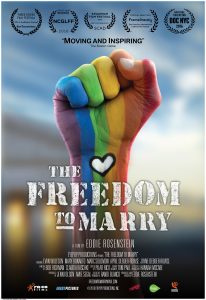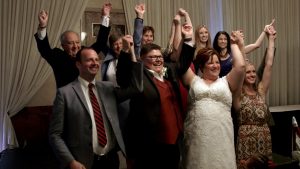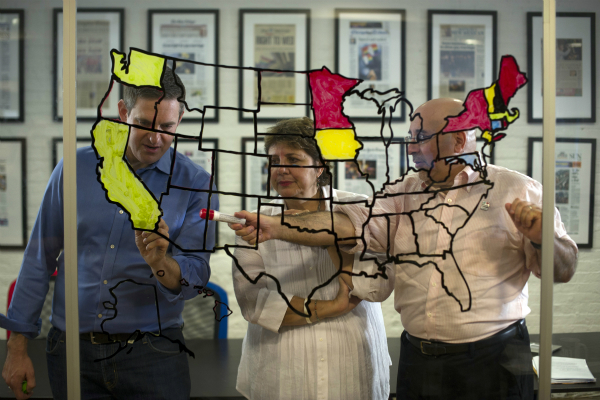The afterglow of the Supreme Court’s 2015 rule on marriage equality finally felt like something tangible had progressed into our lives and homes. The decision felt like a finally released sigh that marked an elevation of rights for LGBTQ people of the nation.

Although many collectively celebrated the long-awaited, landmark decision, the decades long campaign for the freedom to marry winded down to an end, a behind the scenes effort that takes center stage in Eddie Rosenstein’s exceptional documentary “The Freedom to Marry.”
The film follows Evan Wolfson, founder of the organization Freedom to Marry, his team, and those in the LGBTQ community the entire year leading up to the Supreme Court ruling. The film emphasizes that the fight for marriage equality’s increased visibility has been propelled by people like Wolfson, whose everyday work was dominated by finding new angles and approaches to outline the argument for marriage equality.
Interspersed between historical context of the fight for the rights for the LGBTQ community are countdown clips featuring Wolfson and his team. Wolfson has often been seen as the proprietor behind the movement to legalize same-sex marriage and started his fight for equal rights nearly thirty years ago.
After growing up in Pittsburgh (alongside director Rosenstein), Wolfson went to Harvard Law in 1983, where he wrote a thesis entitled “Same-sex Marriage and Morality: The Human Rights Vision of the Constitution” that outlined the argument for marriage equality for the community LGBTQ.
This was the thesis that led him to founding Freedom to Marry. Alongside National Campaign director Marc Solomon, the documentary shows the pair travelling to rallies across the entire nation before the Supreme Court decision came down. The film reveals the often-difficult terrain that comes with promoting equality for the LGBTQ community, including clips of homophobic protests and outright protests against the legalization of same-sex marriage.
Juxtaposing the opposing side of the argument are real stories of couples and families who want the same rights as anybody else. Part of promoting the legalization of marriage equality was introducing the universal notion of parental love; that LGBTQ families wanted the best for the children and their families, above all else, just like heterosexual couples. It was a touching collective truth that became exemplified through the stories of regular families and their stores.

By spotlighting ordinary people who were denied the legality of their families, the campaign for marriage equality became even more necessary and nuanced. April and Jane, a lesbian couple from Michigan, agreed to be the plaintiffs, a decision that required time and energy dedicated to a cause that was bigger than just their family.
“By denying marriage to same sex couples, we’re denying not only the protection to the adults, which is not only independently important,” said Mary Bonauto, a GLAAD lawyer who made one of the arguments in Obergefell v. Hodges. “We’re denying those protections and that security that would come from having married parents.”
Producer Jenni Olson highlighted the usage of these stories as one of the biggest successes of the documentary. “Regular people found a way to stand up,” said Olson. “It’s incredible that they had the courage and willingness to say that we want to make a difference, we want to make things better for our family, but also better for everyone. Now more than ever we need those stories.”
Marriage equality felt like the obvious, mandatory choice for some, and the ruling came with a feeling of “finally.” We forget that this decision, as overdue as it may have seemed, took decades to fight for. We forget the sacrifices and efforts made so that not only would no future generations have to fight for marriage equality, but that this decision does not end the fight for equality on every front for the LGBTQ community.
Olson talked about how almost everyday we wake up and feel overwhelmed and discouraged by the state of the world. It is films like these that remind you that there will always be regular people together and stepping up to make change. “I would like to think there’s another chapter coming,” Wolfson wistfully said at the end of film, signifying another generation will continue the fight for equality.
The Freedom to Marry from ro*co films on Vimeo.


